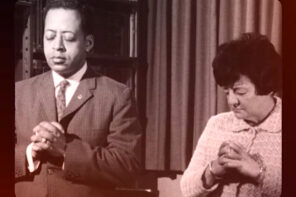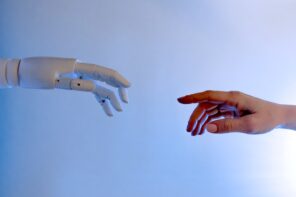Now, be honest: do you think the world is going to be radically transformed, probably not for the better, within your lifetime?
Social scientists tell us that two-thirds of Americans do. And that’s only counting the traditional millennials, the “Left Behind” crowd and their ilk. But as scholar Richard Landes recently described in his sweeping book Heaven on Earth: Varieties of the Millennial Experience, apocalyptic thinking comes in many forms: secular, political, mystical, and many more. Even those of us who aren’t wearing special underwear because we believe we’re about to be levitated out of our clothes still harbor apocalyptic views about climate change, the global financial collapse, even 2012.
The Paranoid Few
How does one respond to such fears? If the consensus of climate scientists is correct (and it is a consensus; here is one survey of scientific opinion), vast swaths of forest will die in the next fifty years, many species will be wiped out, and coastline ecosystems will vanish on a level unseen since the Ice Age. If the worst-case scenarios envisioned by mainstream economists come to pass, our entire economic system is in danger of systemic collapse. And if nanotechnology, genomics, and artificial intelligence continue to evolve at their current rates, we may all live forever, at least as uploaded intellects in a huge mainframe computer.
In short, the paranoid few who seem genuinely disturbed by the possibility of the coming end of the world may be responding the most reasonably to current events. Or not.
This ambiguity is at the heart of Jeff Nichols’ recent film Take Shelter. Like lesser efforts such as M. Night Shyamalan’s Signs, this film explores whether its protagonist is crazy, or a prophet, or both. About three-quarters of the way through, it appears to resolve this tension. Curtis, played by Michael Shannon, has inherited his mother’s paranoid schizophrenia. The massive storm he predicts (and ruins his life to prepare for) does not come to pass. He is about to be medicated, and possibly institutionalized.
But then, in literally the last scene in the movie, Curtis and his family see an oncoming mega-storm that is eerily reminiscent of Curtis’ own nightmares. Nichols has called this a “hopeful” ending, and in an interview Shannon suggests that it was there from the beginning, adding that, in his view, the film is really about anxiety, not mental illness.
What had been one genre of film, a devastating and realistic exploration of one man’s descent into madness, suddenly becomes another: a parable on the nature of millennial anxiety.
Or both simultaneously. Many films exist in this formal inter-zone, with the mystery being part of the appeal. Shyamalan is the master of this game; his films The Village and The Happening both seem to be one kind of movie, only to turn out to be another. These aren’t just plot twists; they’re genre twists, in which audiences are uncertain about the rules of the film’s world itself.
Normally, this distinguishes films sharply from reality. At least under normal circumstances, mine is not a world of dinosaurs, ring-bearers, or talking animals. Films where characters turn out to be dead, or dreaming, or in the Matrix, thus, are distinct from ordinary life.
Take Shelter, though, isn’t. Right before seeing the film, I read an article noting that there were more exorcisms in America last year than in any other year on record. What, really, is the dividing line between religious belief and mental illness? If one person believes the world is about to end, we assume he is crazy. If a thousand believe it, they have religious conviction.
Of course, all religions are pretty preposterous if taken literally. Thousands of pure-lands ruled over by kind bodhisattvas? Golden tablets buried in the New World, containing a history of Canaanite tribes who left absolutely no archeological record? The sun and the moon standing still? Not to mention the holiday season’s wild story of a “magic baby” birthed by a virgin (wittily parodied by a fake Kristen Stewart video that’s currently going viral).
Progressives are supposed to respect fundamentalists’ hyperliteral readings of scripture, even if they defy all logic. But then again we’re not required to respect New Religious Movements (“cults” to you and me), especially if they involve UFOs. Scientology and Mormonism (in some circles) are somewhere in between.
Likewise, some generic sense of messianism is presumably okay. Harold Camping is not. The 54% of Americans who believe the Second Coming will happen before 2050 are somewhere in between. (As for Michele Bachmann, who has said “we are in the last days,” I leave that for you to decide.)
Prophets and Madmen
But does any of this make sense? Let’s take the storm at the end of Take Shelter as an allegorical one. It could represent any number of looming disasters. Is Curtis’ building of a tornado shelter really more paranoid than shifting your money into gold, or learning to grow your own food? What’s brilliant about Take Shelter is that it convinces us that only a madman could behave as Curtis does. But then at the end, it’s not so much that he’s a prophet after all—it’s that none of us know where to stand. Do we trust the nagging voice that tells us something is wrong? Or the calm voice of reason, which may relax us into oblivion?
It seems to me that believing that God buried dinosaur bones is ridiculous. But then, is using the word “God” to describe a projection of experiences, hopes, and dreams not equally so?
As a student of millennialism—I am completing my PhD on the 18th-century messianic heretic Jacob Frank—I know to be skeptical of 2012, Y2K, and anything having to do with the Rapture. The world has always been about to end. But am I, as a result, too skeptical of predictions of global economic collapse?
God, Jesus, and the Rapture are never mentioned during Take Shelter. But as I watched Curtis become increasingly paranoid, I couldn’t help but think of both religious right hand-wringers and spiritual left Jeremiahs. All seem crazy to me. Or are the reasonable people the most insane of all?




